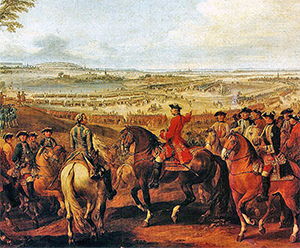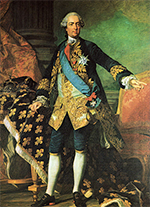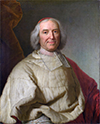The French King Louis XV
Part 2: Wars and Discontent
Louis XV was a strong believer in science and encouraged his scientists to pursue cutting-edge research, such as a Leyden jar experiment in 1746 that harnessed an electric charge. He collected clocks and maps, and he sent his geographers out to all corners of the realm in order to produce the most accurate map possible. France was no stranger to fighting wars. Louis embarked on two within a decade. The War of Polish Succession featured his wife's father, Stanislaw, fighting for the right to become King of Poland; Louis committed French forces to Stanislaw's cause. Eventually ending the war was Cardinal de Fleury, with a treaty that very much benefited France. In 1740, the War of Austrian Succession began. The next year, France entered the war on the side of Prussia. French troops drove toward Vienna but were unable to take it. They did take Prague, however. Austria and Prussia declared a truce in 1742, but the larger war continued. 
Great Britain's King George II led his troops into the fighting at the Battle of Dettingen, in Germany, winning a victory for his Austrian allies. At this time, France attempted to take advantage of the British forces' being distracted on the Continent by invading England. A storm wrecked not only the plans of the French invaders but also "Bonnie Prince Charlie", the grandson of ousted English King James II who was embarking on yet another Jacobite rebellion, an attempt to restore a Stuart to the British throne. The year 1745 saw great French gains in the Netherlands, leaving Prussia effectively on its own, and the formation of the Quadruple Alliance (Austria, the Dutch Republic, Great Britain, and Saxony) to fight against France. One particularly significant French victory over the British came at the Battle of Lauffeldt. British and French armies fought a fierce battle at Fontenoy, on May 11, 1745. British forces, led by the dynamic Duke of Cumberland, ending up leaving the field of battle in defeat, as French forces seized the fortress of Tournay. Louis himself led his troops in battle in the Netherlands, and his army occupied Brussels. French troops also fought in Italy, in a rare instance of France and Spain fighting on the same side. A joint Austria-Savoy victory at the Battle of Colle dell-Assietta in 1747 wiped out most of the French nobility and commanders and effectively ended French participation in that part of the war. A final treaty that ended all fighting was signed at Aix-la-Chappelle on Oct. 18, 1748. France regained control of its fortress at Louisbourg, on Cape Breton Island, in North America, in exchange for handing over Madras, in India, to Great Britain. Fighting between France, Britain, and Spain had taken place in fits and starts in the New World, where the British referred to it as King George's War. One preliminary struggle between Britain and Spain was known as the War of Jenkins' Ear. The war was fought in the Mediterranean and in the Indian Ocean as well. Cardinal Fleury died in 1743, and Louis did not replace him, following in his great-grandfather's footsteps and ruling alone. One of his first acts of sole rule was to implement a new tax in order to pay off the national debt. He alienated the clergy and the nobility by applying the tax to them, not exempting them, as had been the usual practice. It wasn't long until French troops were involved with another two wars, one in the New World and the other in Europe. French fortunes took a large turn for the worse as a result of a defeat in the French and Indian War, as Britain claimed all of New France. In the Seven Years War, Britain allied with Prussia against France. Louis survived an assassination attempt during this war. A supporter of Parlement and enemy of the crown stabbed the king on Jan. 5, 1757; the wound was not fatal. One striking British victory during this time was at the 1759 Battle of Minden, in which an Anglo-Hanoverian force sent a French army running from the field. At nearly the same time, British troops were storming through the Plains of Abraham and seizing Quebec, signaling the beginning of the end of New France. England also held off yet another French seaborne invasion, destroying a French fleet at the Battle of Quiberon Bay in November 1759. In the waning years of the war, Britain profited from aggressive naval action in the various theatres, seizing French trading posts in Africa and French interests in the West Indies and taking Florida and Cuba away from a stunned Spain. British gains in India were significant, as evidenced by Robert Clive's decisive victory in the Battle of Plassey, recapturing of Calcutta, and seizing of the French capital, Pondicherry. One minister upon whom the king depended heavily in the latter years of his reign was the Duke de Choiseul, who was Minister of War and Minister of the Navy. Choiseul modernized the army and the navy and instituted new training methods, based on the model set out by Prussia during the Seven Years War. He also oversaw the French acquisition of the Lorraine and the island of Corsica. 
The long period of warfare necessitated new and higher taxes in order to pay for the men, weapons, and supplies needed to fight those wars. The French people weren't all that happy about paying those taxes and they said so, loudly in some cases. Some refused to hand over their taxes to the royal tax collectors. A succession of finance ministers had no better luck at convincing the people at large to hand over their hard-earned money to eliminate a large amount of war debt for the accumulation of which they had not been consulted. This kind of attitude–that the French people could speak out against their monarch, criticize his decisions, refuse to pay his taxes, demand changes in his government personnel and polices–was relatively new, at least on such a scale. Louis's oldest son, Louis, died in 1765. By then, however, the Dauphin had had a son, also named Louis, and this grandson of Louis XV stayed alive long enough to be declared King Louis XVI. This happened on May 10, 1774, when Louis XV died of smallpox. First page > Early Years > Page 1, 2 |
|
Social Studies for Kids
copyright 2002–2026
David White



 Following in the footsteps of
Following in the footsteps of 
